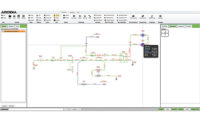VW and the Cloud
By creating an industrial cloud, VW hopes to improve systemwide productivity by 30 percent.

At VW’s commercial vehicle assembly plant in Hannover, Germany, an app amalgamates production data clearly and transparently in one system.
Photo courtesy Volkswagen

Eventually, all of the VW Group’s factories will connect to the company’s Digital Production Platform, which will standardize and simplify exchange of data across systems and plants.
Photo courtesy Volkswagen

Volkswagen expects that its cloud project will increase the productivity of its plants by 30 percent from 2016 to 2025.
Photo courtesy Volkswagen

VW developed its industrial cloud in collaboration with Amazon Web Services.
Photo courtesy Volkswagen

VW’s cloud is not restricted to the company’s own production sites. In 2020, the carmaker opened the cloud up to partners from engineering and technology suppliers.
Photo courtesy Volkswagen

Volkswagen plans to invest $7.1 billion in North America over the next five years to boost its electric vehicle product portfolio, regional R&D, and manufacturing capabilities.
Photo courtesy Volkswagen






You can’t accuse Volkswagen’s Dirk Voigt of having his head in the clouds—he’ll take it as a compliment. The head of digital production at VW, Voigt and a team of manufacturing and IT pros are developing an industrial cloud computing system to amalgamate production data from more than 120 factories. The objective: greater efficiency and lower costs.
The project was launched in 2019, when VW assembly plants in Chemnitz, Germany, Wolfsburg, Germany, and Polkowice, Poland, because the first to transmit production data to the cloud. One year later, 15 additional European factories joined the cloud, including the VW assembly plant in Palmela, Portugal, the Škoda plant in Mlada Boleslav, Czech Republic, and the VW assembly plant in Chattanooga, TN. In 2021, another 24 sites were added to the platform, including VW facilities in South America. Now, all of VW’s major car and component plants are connected.
VW developed the cloud in collaboration with Amazon Web Services (AWS). Volkswagen contributed knowledge of industrial processes and production, while AWS provided expertise in machine learning and cloud computing services. Integration partner Siemens ensures efficient integration of production systems and machines from various manufacturers throughout VW facilities worldwide.
The basis of the industrial cloud is VW’s Digital Production Platform (DPP), onto which all of the group’s sites will dock in the future. The platform standardizes and simplifies exchange of data across systems and plants.
The highest standards ensure data security. For example, integration via the cloud makes it easier to identify the use of unfamiliar software and to react quickly. VW also saves all information processed in the cloud in a kind of digital safe deposit box. The automaker therefore has complete control over whom the data is exchanged with, and for what purpose.
Industrial Cloud as App Store
By 2025, Volkswagen wants to increase the productivity of its plants by 30 percent compared to 2016.
“We will continue to strengthen production as a competitive factor for the Volkswagen Group,” says Oliver Blume, CEO of Porsche and member of the board of management of Volkswagen AG with responsibility for production. “The industrial cloud is a crucial lever for achieving this goal. Data from all factories will be amalgamated and made usable in real time. Volkswagen is thereby laying the foundations for more efficient processes.”
Ultimately, VW expects to reduce costs by several billion euros.
Some of that savings will come from new software, developed in-house, that will facilitate more efficient material flows, optimize operation of machines and installations, and reduce energy consumption. VW has already made available some 30 applications. The apps cover things like preventive maintenance and reduction of rework through artificial intelligence (AI). Just as consumers can download apps to their smartphones, factory management can download apps from the VW cloud to solve problems at their sites. Managers can also use standardized tools to develop site-specific solutions themselves and then make them available to other plants via the cloud.
For example, at VW’s assembly plant in Emden, Germany, engineers have begun using AI software in the cloud to evaluate welding data for better quality control. Until recently, spot welds on car bodies were checked manually using ultrasound. This process took so much time that engineers could only check random samples.
“Now, welding robots will collect data on current flow and voltage automatically. An algorithm checks that the values meet the standards,” explains welding manager Mathias Boomgaarden.
The benefit is that defects will be identified in real time. Members of the inspection team will monitor weld data on a dashboard. If a fault is detected, inspectors can then perform manual checks.
The welding app is a good example of how the cloud has fostered collaboration between factories in the VW Group.
“There is already a similar system in place at Audi. We learned a lot from it,” says Boomgaarden.
The AI software was modified for the Emden plant, and the first installations were connected in a pilot phase. “The results are good. Regular operation is ready to start when the final challenges have been mastered,” says Boomgaarden.
Better Buffers and Labels
At VW’s commercial vehicle assembly plant in Hannover, Germany, an app amalgamates production data clearly and transparently in one system. This enables managers to get a real-time overview of whether potential bottlenecks could occur in production, at just a click of the mouse.
“The aim is to set up an early warning system in production, to eliminate costly disruptions in the factory,” says Jörg Heptner, the man in charge of implementing the data platform at the plant.
VW maintains a buffer of parts between each stage in the production process for commercial vehicles. “The buffers give each production stage some room to breathe. They are not rigidly linked to each other,” explains Heptner. “If a buffer is empty, production comes to a halt. If it is too full, there is a bottleneck.”
In a pilot project for production of the T6.1 van, standardized evaluation of data makes vacancies in the buffer sections transparent, a good indicator of potential disruptions in production. “Identifying the buffers with the longest vacancies enables vulnerabilities to be detected and systematically eliminated,” said Hartmut Lüdtke, head of strategic production concepts and innovation at the plant.
The pilot project was implemented in collaboration with production strategy and IT experts at VW’s corporate headquarters in Wolfsburg. The team is currently working on creating scalable software that can be transferred to other plants with minimal effort. This is due to take place at several sites this year.
At Porsche’s assembly plants in Leipzig and Zuffenhausen, Germany, AI is being used to inspect labels in different languages quickly and accurately. Just like everyday passenger vehicles, Porsche sports cars contain various labels providing information, warnings or instructions. However, because Porsche sports cars are exported all over the world, many of these stickers contain country-specific information and are written in the customer’s language. An AI app uses machine vision to inspect the labels in real time and provide feedback on whether each label is appropriate for that vehicle. This saves several minutes per vehicle.
Engineers train the AI software to evaluate optical data and detect errors. Since the trial phase has been successful, the label inspection software will be made available via the cloud to other VW plants.
Helping Hand
VW’s cloud is not restricted to the company’s own production sites. In 2020, the carmaker opened the cloud up to partners from engineering and technology suppliers that can provide their own software. For example, one of these corporations developed an algorithm that uses AI to optimize the use of driverless transportation systems. Another corporation developed an app to simulate and test different maintenance intervals for machines. As the number of partners grows, so does the range of apps to which every site has access.
In the long term, Volkswagen is aiming to create an open marketplace for industrial applications. “On that kind of platform, everyone involved would be able to swap, acquire and use each other’s applications. It would be a place open to all companies—including suppliers, technology partners and even other car manufacturers,” says Nihar Patel, executive vice president for new business development at VW.
As a first step, 11 companies—ABB, ASCon Systems, BearingPoint, Celonis, Dürr, Grob-Werke, MHP, NavVis, Synaos, Teradata and WAGO—have joined VW’s industrial cloud.
“With the industrial cloud, we are creating a platform allowing partners to contribute their solutions. This will help the Volkswagen Group achieve global efficiencies at its plants. At the same time, we are creating a pathway for partners to scale their applications and optimize their own operations. This way, everyone will benefit,” says Patel.
Looking for a reprint of this article?
From high-res PDFs to custom plaques, order your copy today!












